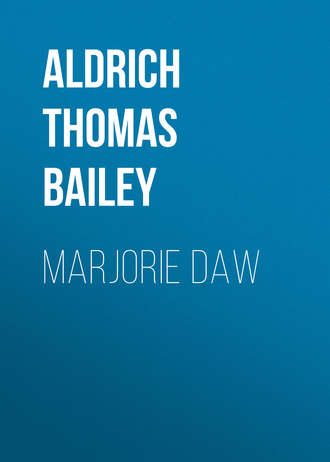
Aldrich Thomas Bailey
Marjorie Daw
VIII
EDWARD DELANEY TO JOHN FLEMMING
August 22, 1872.
Your letter in reply to my last has occupied my thoughts all the morning. I do not know what to think. Do you mean to say that you are seriously half in love with a woman whom you have never seen—with a shadow, a chimera? for what else can Miss Daw to be you? I do not understand it at all. I understand neither you nor her. You are a couple of ethereal beings moving in finer air than I can breathe with my commonplace lungs. Such delicacy of sentiment is something that I admire without comprehending. I am bewildered. I am of the earth earthy, and I find myself in the incongruous position of having to do with mere souls, with natures so finely tempered that I run some risk of shattering them in my awkwardness. I am as Caliban among the spirits!
Reflecting on your letter, I am not sure that it is wise in me to continue this correspondence. But no, Jack; I do wrong to doubt the good sense that forms the basis of your character. You are deeply interested in Miss Daw; you feel that she is a person whom you may perhaps greatly admire when you know her: at the same time you bear in mind that the chances are ten to five that, when you do come to know her, she will fall far short of your ideal, and you will not care for her in the least. Look at it in this sensible light, and I will hold back nothing from you.
Yesterday afternoon my father and myself rode over to Rivermouth with the Daws. A heavy rain in the morning had cooled the atmosphere and laid the dust. To Rivermouth is a drive of eight miles, along a winding road lined all the way with wild barberry bushes. I never saw anything more brilliant than these bushes, the green of the foliage and the faint blush of the berries intensified by the rain. The colonel drove, with my father in front, Miss Daw and I on the back seat. I resolved that for the first five miles your name should not pass my lips. I was amused by the artful attempts she made, at the start, to break through my reticence. Then a silence fell upon her; and then she became suddenly gay. That keenness which I enjoyed so much when it was exercised on the lieutenant was not so satisfactory directed against myself. Miss Daw has great sweetness of disposition, but she can be disagreeable. She is like the young lady in the rhyme, with the curl on her forehead,
“When she is good,
She is very, very good,
And when she is bad, she is horrid!”
I kept to my resolution, however; but on the return home I relented, and talked of your mare! Miss Daw is going to try a side-saddle on Margot some morning. The animal is a trifle too light for my weight. By the bye, I nearly forgot to say that Miss Daw sat for a picture yesterday to a Rivermouth artist. If the negative turns out well, I am to have a copy. So our ends will be accomplished without crime. I wish, though, I could send you the ivorytype in the drawing-room; it is cleverly colored, and would give you an idea of her hair and eyes, which of course the other will not.
No, Jack, the spray of mignonette did not come from me. A man of twenty-eight doesn’t enclose flowers in his letters—to another man. But don’t attach too much significance to the circumstance. She gives sprays of mignonette to the rector, sprays to the lieutenant. She has even given a rose from her bosom to your slave. It is her jocund nature to scatter flowers, like Spring.
If my letters sometimes read disjointedly, you must understand that I never finish one at a sitting, but write at intervals, when the mood is on me.
The mood is not on me now.
IX
EDWARD DELANEY TO JOHN FLEMMING
August 23, 1872.
I have just returned from the strangest interview with Marjorie. She has all but confessed to me her interest in you. But with what modesty and dignity! Her words elude my pen as I attempt to put them on paper; and, indeed, it was not so much what she said as her manner; and that I cannot reproduce. Perhaps it was of a piece with the strangeness of this whole business, that she should tacitly acknowledge to a third party the love she feels for a man she has never beheld! But I have lost, through your aid, the faculty of being surprised. I accept things as people do in dreams. Now that I am again in my room, it all appears like an illusion—the black masses of Rembrandtish shadow under the trees, the fireflies whirling in Pyrrhic dances among the shrubbery, the sea over there, Marjorie sitting on the hammock!
It is past midnight, and I am too sleepy to write more.
Thursday Morning.
My father has suddenly taken it into his head to spend a few days at the Shoals. In the meanwhile you will not hear from me. I see Marjorie walking in the garden with the colonel. I wish I could speak to her alone, but shall probably not have an opportunity before we leave.
X
EDWARD DELANEY TO JOHN FLEMMING
August 28, 1872.
You were passing into your second childhood, were you? Your intellect was so reduced that my epistolary gifts seemed quite considerable to you, did they? I rise superior to the sarcasm in your favor of the 11th instant, when I notice that five days’ silence on my part is sufficient to throw you into the depths of despondency.
We returned only this morning from Appledore, that enchanted island—at four dollars per day. I find on my desk three letters from you! Evidently there is no lingering doubt in your mind as to the pleasure I derive from your correspondence. These letters are undated, but in what I take to be the latest are two passages that require my consideration. You will pardon my candor, dear Flemming, but the conviction forces itself upon me that as your leg grows stronger your head becomes weaker. You ask my advice on a certain point. I will give it. In my opinion you could do nothing more unwise that to address a note to Miss Daw, thanking her for the flower. It would, I am sure, offend her delicacy beyond pardon. She knows you only through me; you are to her an abstraction, a figure in a dream—a dream from which the faintest shock would awaken her. Of course, if you enclose a note to me and insist on its delivery, I shall deliver it; but I advise you not to do so.
You say you are able, with the aid of a cane, to walk about your chamber, and that you purpose to come to The Pines the instant Dillon thinks you strong enough to stand the journey. Again I advise you not to. Do you not see that, every hour you remain away, Marjorie’s glamour deepens, and your influence over her increases? You will ruin everything by precipitancy. Wait until you are entirely recovered; in any case, do not come without giving me warning. I fear the effect of your abrupt advent here—under the circumstances.
Miss Daw was evidently glad to see us back again, and gave me both hands in the frankest way. She stopped at the door a moment this afternoon in the carriage; she had been over to Rivermouth for her pictures. Unluckily the photographer had spilt some acid on the plate, and she was obliged to give him another sitting. I have an intuition that something is troubling Marjorie. She had an abstracted air not usual with her. However, it may be only my fancy.... I end this, leaving several things unsaid, to accompany my father on one of those long walks which are now his chief medicine—and mine!







